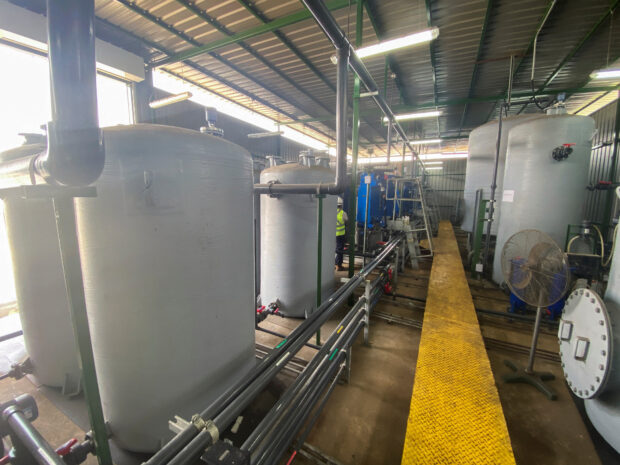Singapore to expand ocean CO2 removal project as scientists call for more research

A view shows the interior of Equatic’s pilot ocean carbon removal project at the Tuas Desalination Plant in western Singapore, August 30, 2023. REUTERS FILE PHOTO
SINGAPORE — Singapore is planning to expand a pilot project that boosts the ocean’s capacity to absorb carbon dioxide emissions, using one of several emerging technologies that supporters hope can play a decisive role in the global battle against climate change.
As scientists call for more research into ocean carbon dioxide removal (OCDR), PUB, Singapore’s national water agency, has built a plant that uses electricity to extract CO2 from seawater, allowing it to absorb more greenhouse gas from the atmosphere when it is pumped back out into the ocean.
The project, built at a desalination facility on Singapore’s western coast, extracts 100 kilograms of CO2 a day using technology designed by U.S. firm Equatic, founded by scientists at the University of California, Los Angeles (UCLA).
At the plant, seawater is run through an electrolyzer, which converts dissolved CO2 into calcium carbonate and produces hydrogen.
PUB is aiming to secure funds by the end of the year to build a demonstration plant with a daily capacity of 10 tons, and will look at expanding further, said Gurdev Singh, a PUB general manager who leads the project.
“We have shown that the technology works, but the key now is to optimize the technology at scale,” he said.
The Intergovernmental Panel on Climate Change (IPCC) has said the removal of CO2 in the atmosphere will be as important as cutting emissions when it comes to curbing temperature rises.
But while OCDR has been described by one environmental group as an “unsung hero” in the fight against global warming, it remains unclear whether the new technologies are feasible when deployed at scale.
Equatic founder Gaurav Sant stressed the commercial potential.
“What makes this a resilient commercial opportunity is that you can essentially have the same equipment to give you two products: carbon credits and hydrogen,” he said.
It could also profit by selling calcium carbonate to the local building industry, he added.
The project is one of several pilot OCDR ventures around the world. Some rely on bringing nutrient-rich deep-sea water to the surface to stimulate seaweed growth, while others aim to reduce ocean acidification levels and thereby boost CO2 uptake.
Some experts warn that the potential ecological impact of these technologies is still unknown. On Tuesday, more than 200 scientists said in an open letter that OCDR research should be prioritized not only to maximize its potential, but also head off potential risks.
Sir David King, head of the Climate Crisis Advisory Group and one of the letter’s signatories, said he favored nature-based approaches, and was skeptical about the efficacy of energy-intensive OCDR technologies like the Equatic venture, which will cost a lot to pump water in and out of the plant.
But billions of tons of CO2 need to be removed from the atmosphere, and more investment in OCDR research was needed urgently, he said.
“What is needed today is to shorten the experimental timeline, and that really demands much more funding,” he said.
“If somebody came up with a few billion dollars, I believe we would accelerate these programs to the level that is really needed.”